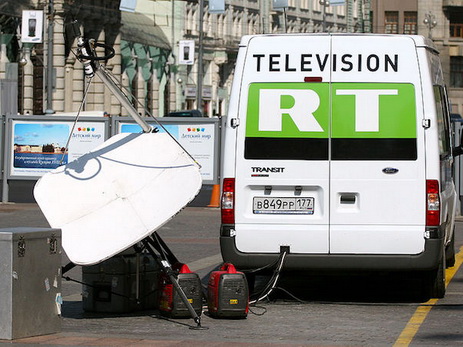Reporting in and by America: From Russia Today to Radio Liberty

By Maayan Jaffe-Hoffman
Ever since the Russian television network RT was implicated as part of a declassified U.S. intelligence report that accused the Russian government of interfering in the 2016 U.S. election – presumably tipping it in favor of Donald Trump – there have been several calls to register RT as a foreign agent.
The argument is that by enforcing the Foreign Agents Registration Act of 1938 (FARA) against RT, it would alert potential media consumers of the station’s alliance and allegiance with the Russian government.
The purpose of FARA, according to the United States Department of Justice, is to ensure that the people of the U.S. are informed of the source of information (propaganda) and the identity of any media outlet, organization or people trying to influence U.S. public opinion, policy and laws.
It does not prohibit the influencer or agent’s ability to distribute information, nor does it suppress freedom of speech. Rather, it is a disclosure statute that supplements or labels information.
That’s important. However, before we go labeling foreign news outlets, maybe we should look at what is going on with our own foreign reporting.
Take Radio Free Europe/Radio Liberty (RFE/RL). The U.S.-government funded broadcasting organization provides news updates and on-demand audio of broadcasts in different languages to countries in Eastern Europe, Central Asia and the Middle East. It was established as an American propaganda machine, chiefly against the Soviets and their satellites. Though that need has since dissipated, Congress keeps RFE/RL running – on taxpayer dollars.
But while the organization claims to be a non-biased member of the free press, its reporting reflects otherwise. A 2013 report by the Office of the Inspector General of the U.S. Department of State found that the and the Broadcasting Board of Governors (BBG), which is supposed to provide a firewall against political influence on its new broadcasting is poorly structured and lax about observing its own bylaws, which leads to both internal conflicts and conflicts of interest. The Inspector General also accused BBG of not providing RFE/RL with sufficient oversight.
The challenge is even more acute when you look at the fact that RFE/RL is not only misreporting, but propagandizing against U.S. allies. A few years ago, I reported about RFE/RL’s coverage of U.S. ally Azerbaijan in a piece published by Roll Call. Then, I found that in a one-month period, RFE/RL had published 30 articles and videos about Azerbaijan, not one celebrating the country’s efforts to build an inclusive, tolerant society, its strong international collaboration and friendship with America and even Israel. Instead, articles accused Azerbaijan, a stable ally of the U.S. in the Caspian region, of being a closed, anti-democratic and fear-mongering society.
It is not that Azerbaijan does not have its share of governmental and human-rights-related challenges, but there was not one positive piece back then. It then ran nothing negative or of pressure against America’s adversary, Armenia. RFE/RL is our international voice and we are speaking against ourselves!
Today, the reporting is slightly better. However, there is still clearly an anti-Azerbaijan agenda. My guess is that this is largely because the country is pro-Western and anti-terrorist, and therefore journalists fear coming out against it less than they do rogue regimes. But RFE/RL readers have a right to know.
Congress adopted FARA in the 1930s in response to the large number of Nazi Germany propaganda agents in the pre-WWII U.S. It was meant to ensure that Americans were not misled into thinking they were receiving information from a disinterested source. Now, many are calling on the government to use FARA against RT.
I would like to call on the government to take a hard look at itself before acting. Don’t we owe it to international readers of RFE/RL to know what biases, influences and conflicts of interest are behind its reporting, too? Can we enact FARA against one of our own?
A free press is the foundation of any vibrant and viable democracy. If any media outlet is a propaganda machine, pandering to special interest groups, personal agendas, money or even fear of reprisal by extremist regimes or ISIS, then we need to label it as such. Otherwise, the very democratic ground on which America stands could not-too-slowly begin to crack.
Maayan Jaffe-Hoffman is a commentator, journalist, a former editor for The Jerusalem Post and a former editor-in-chief of The Baltimore Jewish Times.














